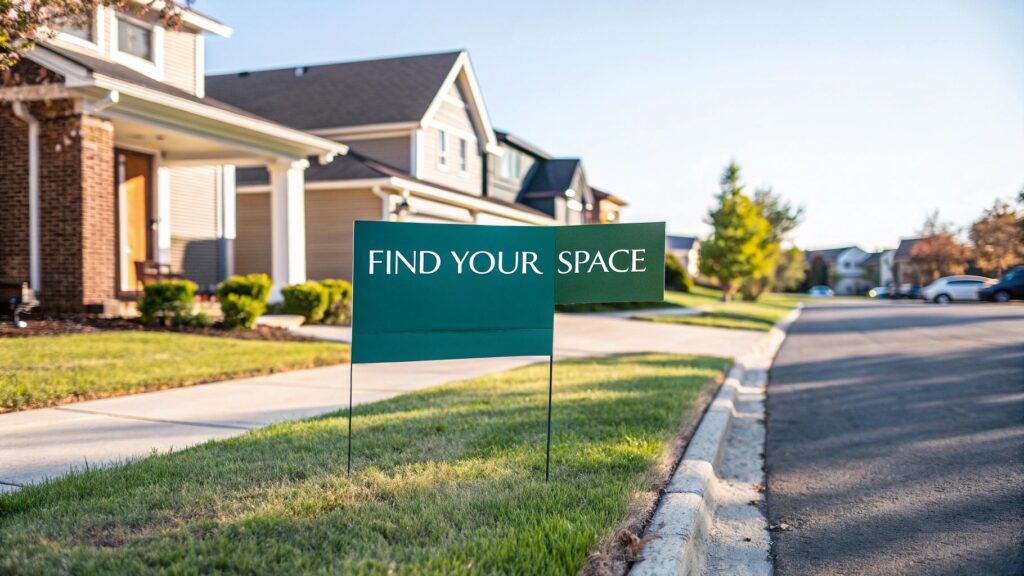Before you even start dreaming about that perfect 2 bedroom home for rent, let's talk money and priorities. I know it's not the fun part, but trust me, getting your financial plan straight from the get-go is the single most important thing you can do. It prevents so much stress and disappointment down the road.
Defining Your Budget and Must-Haves
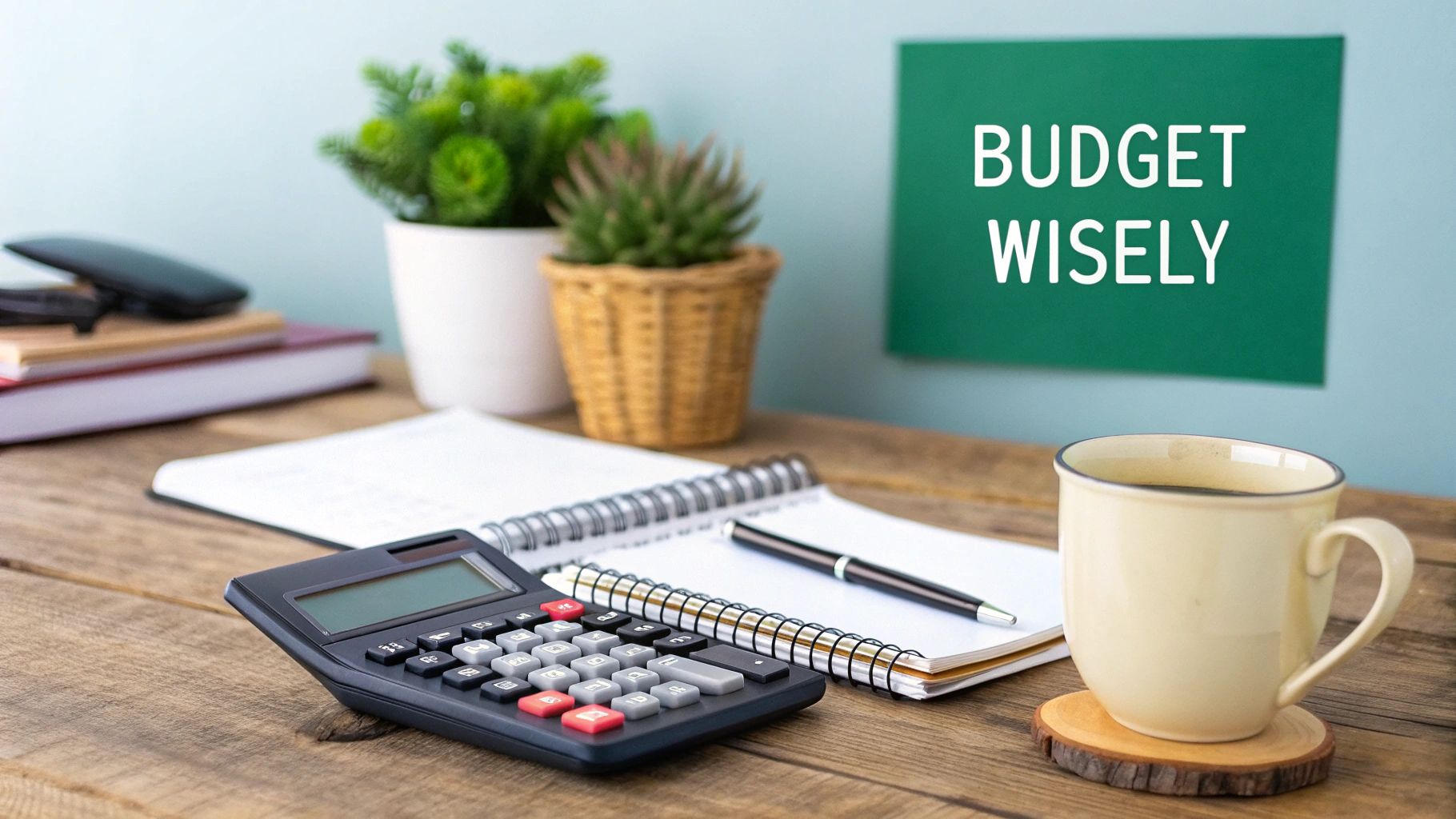
Putting together a real-world budget means looking far beyond the sticker price you see on a listing. You have to account for all the little costs that add up.
The rental market is always in flux, but it helps to have a baseline. For instance, recent data showed the average rent for a two-bedroom apartment hovering around $1,356 in early 2025. The good news for renters is that this number reflects a slight cooling from the crazy highs we saw previously.
Calculating Your True Rental Cost
The advertised rent is just the beginning. To avoid any nasty surprises on move-in day, you need to add up all the other expenses—both one-time fees and those recurring monthly bills.
Here's a quick rundown of what to expect:
- Security Deposit: Plan on this being equal to one month's rent. Landlords can sometimes ask for more, so always clarify.
- Utilities: Don't forget to budget for electricity, water, gas, and internet. Some properties make this easier, and you can learn more about finding 2-bedroom apartments with utilities included in our other guide.
- Application Fees: These are pretty standard and usually non-refundable. Expect to pay anywhere from $25 to $100 per applicant.
- Pet Fees: Bringing a pet? You'll likely face a one-time deposit plus a monthly "pet rent."
And that's not all. The move itself has costs. It’s smart to read up on the common hidden costs in moving house so you aren't caught off guard.
To give you a clearer picture, here’s what a typical monthly budget might look like beyond just the rent check.
Sample Monthly Rental Budget for a 2-Bedroom Home
| Expense Item | Estimated Monthly Cost |
|---|---|
| Rent | $1,356 (based on national average) |
| Electricity | $75 – $150 |
| Water & Sewer | $40 – $80 |
| Internet & Cable | $80 – $120 |
| Renter's Insurance | $15 – $30 |
| Pet Rent (if applicable) | $25 – $75 |
| Estimated Total | $1,591 – $1,811 |
This table is just an example, but it shows how quickly the "real" cost can climb above the advertised rent. Always run your own numbers based on local rates.
Prioritizing Your Wish List
With a solid budget in hand, your next step is to get organized. I always tell people to make two simple lists: "must-haves" and "nice-to-haves." This is your secret weapon for a fast, effective search.
A "must-have" is a deal-breaker—something you absolutely cannot live without. A "nice-to-have" is a bonus feature that would be great but isn't essential. This simple distinction is the key to a focused and successful apartment search.
It helps you immediately filter out places that won't work and zero in on the ones that have real potential.
Getting to Know the Boca Raton Rental Market
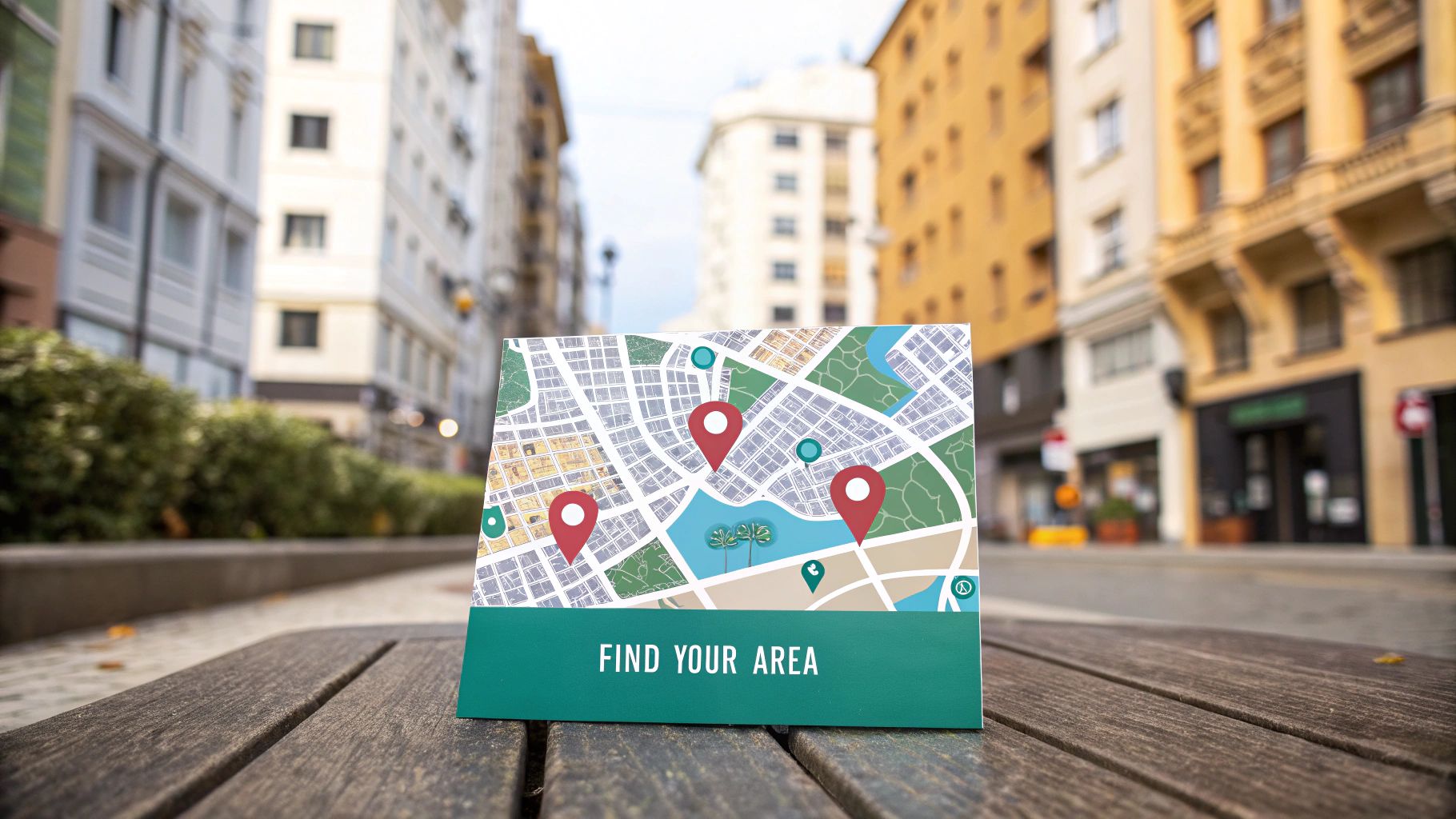
Finding the perfect 2 bedroom home for rent in Boca Raton is as much about the neighborhood as it is about the house itself. This city is a patchwork of different communities, each with a unique feel and, of course, a different price tag. Getting a feel for this landscape is your first real step.
For instance, if you're looking near Mizner Park, you'll be right in the thick of high-end restaurants and shops, and your rent will absolutely reflect that lifestyle. Head a bit further west, and you’ll find the vibe shifts to a quieter, more suburban setting where your money might get you more square footage.
Think about what you really want your daily life to look like. Is it walkability to coffee shops and entertainment? Or is it peaceful streets and easy access to great schools? Nail this down first, and your search will become a whole lot easier.
Your Search: Timing and Tools of the Trade
When you start looking can make a big difference in what you find and what you pay. The rental market here tends to cool off in the late fall and winter. If you can time your search for this "off-season," you might just find landlords are a bit more flexible on price to fill an empty unit.
On the flip side, spring and summer are peak season. You'll see way more homes on the market, which is great for options, but you'll also be up against more competition and potentially higher rents.
Once you’re ready to dive in, you need the right tools. Don’t just stick to the big-name websites; a savvy search uses a mix of resources.
- The Big Listing Sites: These are your go-to for casting a wide net and seeing what’s out there.
- Local Property Managers: Check the websites of local management companies directly. They often post their new rentals there before they hit the major portals.
- Community Groups: Never underestimate local social media forums. You can often find hidden gems and rent directly from the owner, skipping the middleman.
The right app or website can make your life so much easier. You can find some great rundowns on the best apartment search apps that compare features and help you stay organized. Using a few of these resources together gives you the most complete picture of what’s really available.
Touring and Evaluating Properties Like a Pro
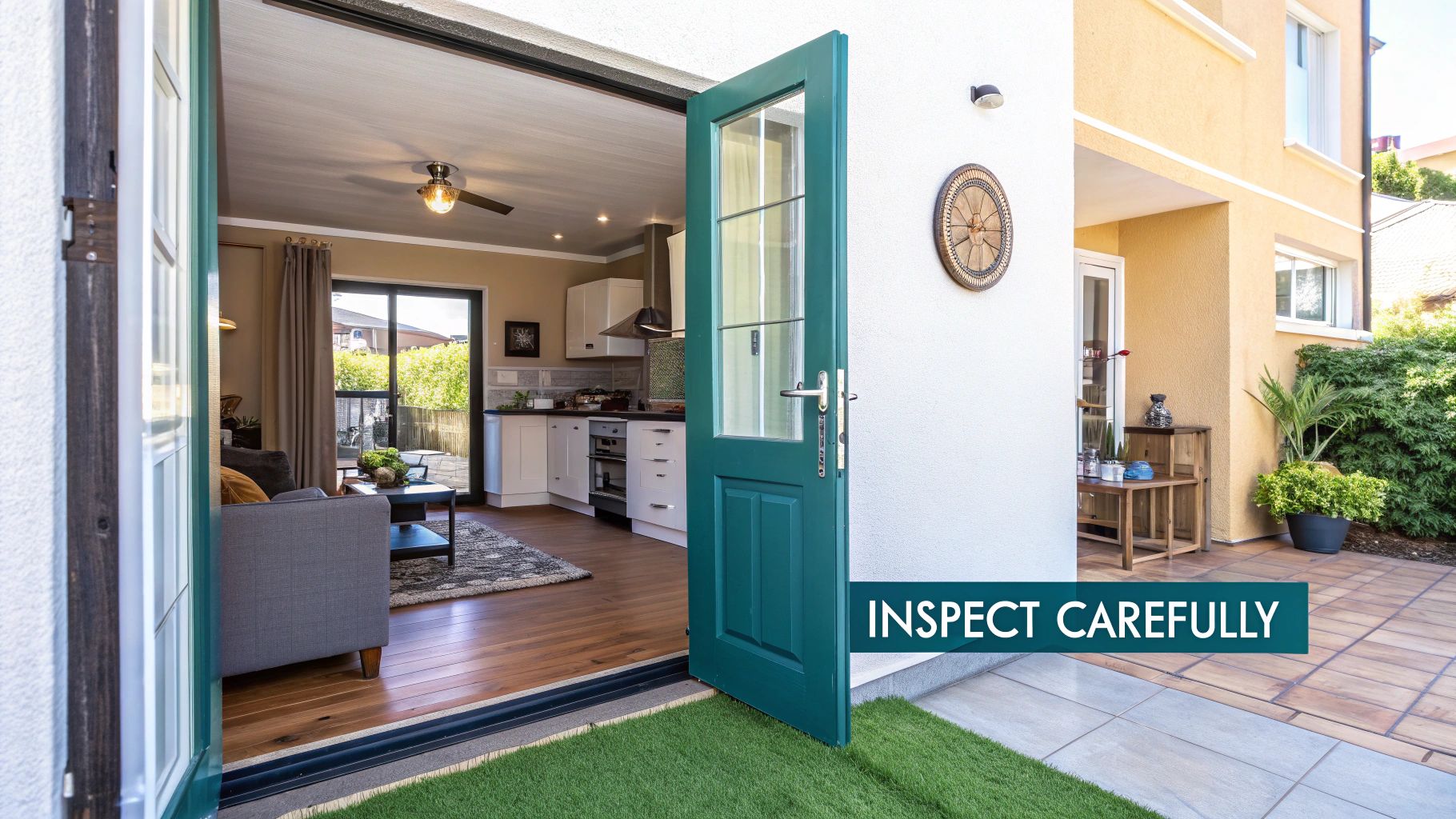
The online pictures looked perfect, right? Now comes the real test. The in-person tour is where you get to see past the wide-angle lenses and perfect lighting to figure out if a place is actually right for you. Think of yourself as a detective.
This is your chance to really interact with the space, not just breeze through it. Go ahead—turn on the faucets and check the water pressure. Open every window, closet, and cabinet door. You'd be amazed what you can uncover just by testing the things you'll be using every single day.
Looking for Red Flags
It's easy to get swept up by a great layout or big, sunny windows. But the real goal here is to spot potential problems that could turn into major headaches down the road. You have to train your eye to look for the little things.
Keep an eye out for these common issues:
- Signs of Water Damage: Look for faint yellow or brown stains on the ceilings and check for any warped floorboards or baseboards, especially under sinks. This could signal old, unresolved leaks.
- Appliance Age and Condition: Don't be afraid to look for the manufacturing date sticker on the HVAC unit, water heater, and kitchen appliances. Older units are usually less efficient and a lot more likely to fail when you need them most.
- Cell Signal and Connectivity: Pull out your phone and walk through every room. Check your bars. A dead zone in the master bedroom or home office can be a dealbreaker.
Be thorough in documenting everything. Take photos, and even short videos, of anything that seems off. To make sure you don't miss a thing, bring along our detailed apartment viewing checklist—it’s a lifesaver.
Remember, you're not just evaluating the apartment; you're interviewing the landlord or property manager. How they handle the tour says a lot about how they'll handle a leaky faucet on a Sunday morning.
Don't hesitate to ask pointed questions. Find out about average utility costs, how maintenance requests are handled, and what the community rules are. A professional landlord will have straightforward answers ready for you.
Crafting a Winning Rental Application
In a hot market like Boca Raton, just finding the perfect 2 bedroom home for rent feels like a victory. But the race isn't over yet. Your application is what truly gets you across the finish line, especially when landlords are sifting through a stack of them for a popular property.
Think of your application as your first impression. A complete, professional-looking package tells a landlord you're serious and organized. Honestly, being prepared is one of the easiest ways to get a leg up—you can often secure a place simply by being the first one to hand over a full set of documents.
Assembling Your Application Toolkit
Before you even start looking, I always tell clients to get their "application toolkit" ready. When you find the right place, you want to be able to act fast, not scramble to find a pay stub from two months ago.
Here's what you'll want to have on hand:
- Proof of Income: Grab your last two pay stubs. If you're starting a new job, a formal offer letter usually works just as well. The magic number for landlords is an income that's about three times the monthly rent.
- Identification: A simple, clear copy of your driver's license or other government-issued photo ID is a must. Make sure you have one for every adult who will be living in the home.
- References: Line up your references ahead of time. This should include past landlords if possible, plus a professional or personal contact. Always—and I can't stress this enough—ask their permission first and let them know a landlord might be calling.
A well-written cover letter is your secret weapon. It’s your chance to go beyond the form fields, introduce yourself, and explain what you love about the home. It adds a human element that can make all the difference.
It also helps to understand what's on a landlord's mind right now. With rising taxes and maintenance costs in 2024 and 2025, they're more risk-averse than ever. Knowing that over 40% of renters are looking for pet-friendly homes and another 40% are focused on affordability gives you insight. If you have a well-behaved pet or appreciate the home's energy-efficient appliances (which save you money!), mentioning it shows you're a thoughtful applicant. For a deeper dive, check out the latest rental market trends on Resimpli's blog.
Once you get that "you're approved!" email, there’s one last crucial step: the lease. Read every word. Pay close attention to clauses about the security deposit, who handles what maintenance, and the penalties for breaking the lease. If something feels off or unclear, don't hesitate to ask for clarification or suggest a minor change. It's much easier to negotiate a term before you sign on the dotted line.
Securing Your New Home and Planning the Move
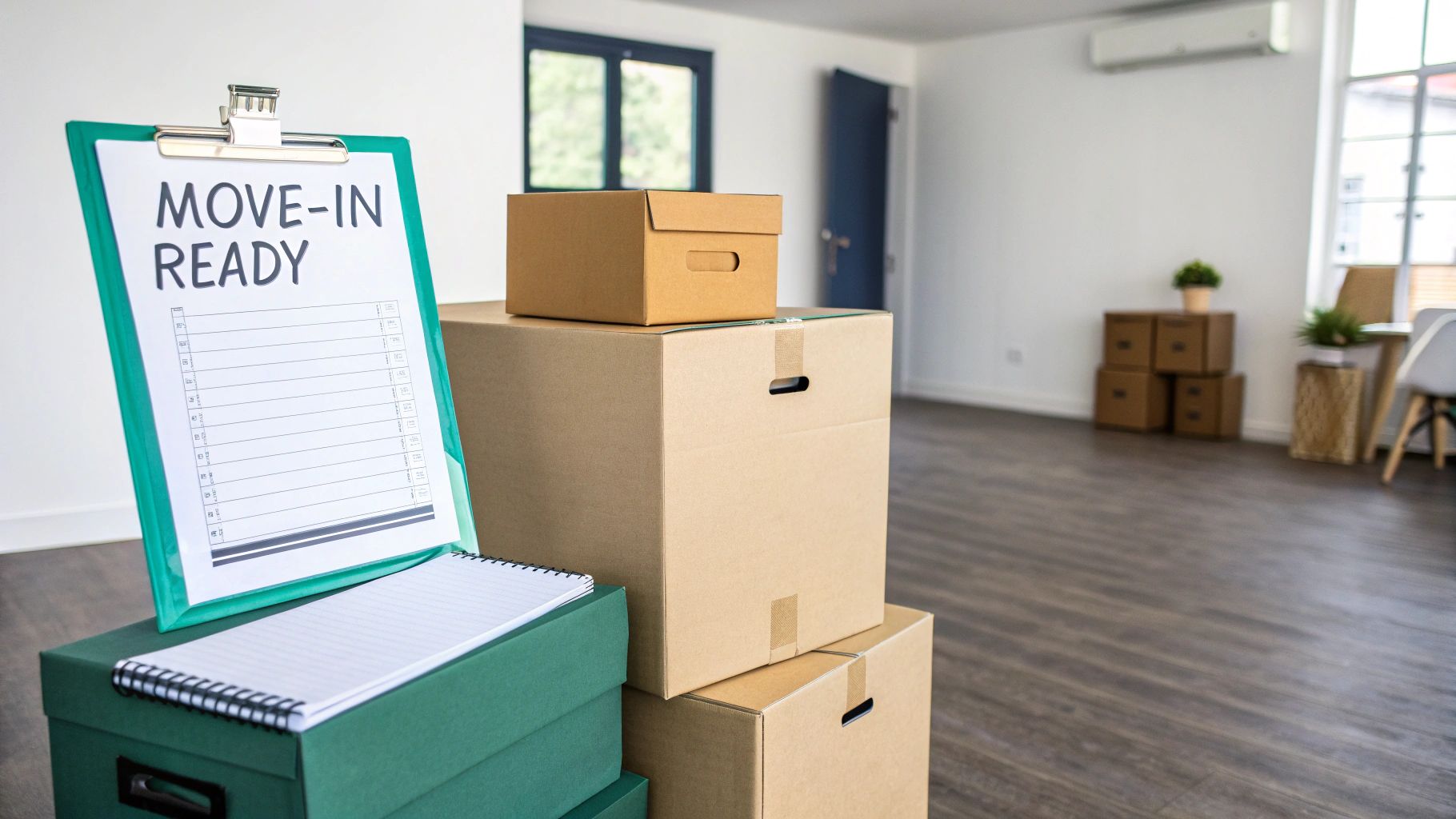
You did it. With that signed lease in hand, you've officially locked down your 2 bedroom home for rent. The search is over, but now the real work begins: turning that empty space into your new home. It’s all about logistics from here, and a little organization goes a long way.
First things first, let's talk money. You'll need to pay the security deposit and the first month’s rent to seal the deal. I always advise clients to use a trackable payment method—think cashier's check or an official online portal. Steer clear of cash unless you have no other choice.
No matter how you pay, get a signed, itemized receipt immediately. This little piece of paper is your proof of payment and can save you major headaches down the road.
The Pre-Move Checklist
With the keys practically in your hand, it's time to start piecing together the moving puzzle. This is about more than just stuffing things into boxes; it’s about making sure your new home is livable from the moment you walk in.
Here are a few things you can’t forget:
- Get the Utilities Set Up: Call the electricity, water, and internet companies at least two weeks before your move. You’ll want to schedule service to start on your official move-in day so you’re not left in the dark.
- Forward Your Mail: Head over to the USPS website and get your address officially changed. It’s a simple task that ensures your important mail follows you to your new place.
- Book Your Movers (or Truck): Whether you're hiring a full-service moving company or just renting a U-Haul, book it well in advance. Last-minute bookings almost always mean higher prices and less availability, especially if you’re moving during a busy time.
Getting everything set up can feel overwhelming. For a great breakdown of what to handle and when, check out an ultimate checklist for appliance and home setup when moving.
Here's a pro tip: The single most important thing you'll do on move-in day is the walkthrough with your landlord. Take pictures of everything, fill out the inspection checklist together, and make sure you both sign it. This document is your best defense for getting your full security deposit back when you eventually move out. Don't skip it.
Answering Your Top Questions About Renting a 2-Bedroom Home
When you're searching for 2 bedroom homes for rent, a few questions always come up. It's a big decision, and getting the right answers can make the difference between a smooth process and a stressful one. Let’s tackle some of the most common things renters ask.
One of the first hurdles is always income. Landlords want to see that you can comfortably afford the rent, and the go-to standard is the 3x rule. This simply means your gross monthly income (before taxes) should be at least three times the rent. So, for a place listed at $2,200 a month, you'll need to show you bring in about $6,600.
How Can I Make My Application Stand Out?
In a popular area like Boca Raton, you can bet you’re not the only one applying. So how do you get noticed? It’s about more than just having a good credit score.
A simple, well-written cover letter can work wonders. Just a short note introducing yourself and mentioning what you like about the property adds a personal touch that a stack of generic applications won't have. It shows you're serious and helps the landlord see you as a person, not just a number.
It also pays to know what's happening in the market. While rent prices have been a rollercoaster, things are starting to level out. In fact, data from May 2025 revealed that the median rent for two-bedroom homes has dropped year-over-year for 22 months in a row. This little bit of knowledge can give you some leverage when you're ready to talk numbers. You can dive deeper into the latest rental market trends on Realtor.com.
Should I Rent from a Private Owner or a Management Company?
This is a classic crossroads for renters. There’s no single right answer here—it really comes down to your personal style and what you prioritize in a living situation.
Renting from a private owner often feels more personal. Communication is direct, and there might be more wiggle room on lease terms. But with a professional management company, you get streamlined systems, like online rent payments and a dedicated maintenance crew ready to handle repairs.
Think about what matters most to you. Do you prefer having a direct line to the person who owns the property? A private landlord could be your best bet. Or do you value the convenience of 24/7 maintenance and established, professional procedures? If so, a managed community is probably the way to go.
At Cynthia Gardens, we blend professional management with a real community feel. Explore our available Boca Raton apartments today!
